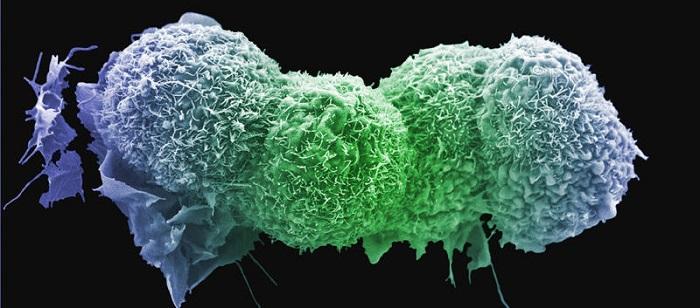An international consortium of academic and industrial leaders in the field of cancer research, including researchers at the Wellcome Sanger Institute, has announced the launch of a new research programme called “PERSIST-SEQ”.
PERSIST-SEQ intends to provide the cancer research community with a new gold standard workflow for single-cell sequencing by developing and validating best practices, as well as generating and analysing high-quality data.
The project aims to empower the scientific community to unravel drug resistance and develop smarter therapeutic strategies to better treat cancer and prevent resistance. PERSIST-SEQ is a five-year public-private partnership, which is funded by the Innovative Medicines Initiative (IMI), and led by the Oncode Institute and AstraZeneca, with the Wellcome Sanger Institute as one of the collaborators.
Cancer takes nearly 10 million lives each year worldwide*, 90 per cent of which result from untreatable cancer relapse occurring after initially effective treatment**. Therapeutic resistance is one of the primary causes of cancer death and is clinically difficult to predict, prevent or treat. Although resistance has been studied extensively in the last decades, there is no comprehensive understanding of its underlying mechanisms, nor how they differ between cancer types or therapies.
A better understanding of these mechanisms can contribute to better patient stratification, the development of effective drug strategies targeting the resistance mechanisms as well as improved cancer treatment strategies. Moreover, resistance is a major industrial challenge since it causes failure in the drug discovery and development process. Therapeutic resistance is largely unpredictable and difficult to model. Therefore, better tools are needed to identify or predict resistance mechanisms. These tools would, in turn, decrease the costs and risks associated with cancer drug development significantly.
Dr Ultan McDermott, Chief Scientist at AstraZeneca and industrial co-lead of PERSIST-SEQ, said: “Drug resistance in cancer is one of the greatest causes of mortality and despite increasing success with targeted therapies in the clinic, how cancer cells survive drug treatment is still not well understood. We are excited to co-lead this European industry-academic partnership, using state-of-the-art single-cell sequencing to characterise 5 million single cells over 5 years to understand and overcome drug resistance.”
Current experimental approaches fail to study residual disease, the major cause of cancer relapse, and therapeutic resistance in clinically meaningful ways. In the last years novel methods in single-cell sequencing have seen significant advancements. Such techniques combined with advanced cancer modelling approaches can shed light on the intricate processes underlying therapeutic resistance and residual disease. Understanding the mechanisms of cancer resistance is crucial to enable its mitigation and requires a coordinated effort.
To address these challenges, PERSIST-SEQ has formed a coalition of field-leading researchers and medical oncologists on cancer resistance who will leverage their ingenious cancer modelling approaches and cutting-edge techniques to perform the sequencing of single tumour cells. PERSIST-SEQ will refine and standardise a broadly applicable workflow for single-cell sequencing in order to improve the understanding of therapeutic resistance in cancer and develop targeted prevention and mitigation techniques.
Professor Alexander van Oudenaarden, Group Leader at the Hubrecht Institute and Principal Investigator of PERSIST-SEQ, said: “I am very excited to be part of this consortium. Not only because of the importance of understanding tumour drug resistance, but also because we will perform this project in close collaboration with industrial partners. I am sure we will learn a lot from each other.”
Dr Mathew Garnett, Group Leader at the Wellcome Sanger Institute, added: “This international research consortium will allow us to gain a new level of understanding of cancer cells and how they develop resistance to treatment. This research will inform new therapies, which could help improve the lives of the millions of people that are living with cancer every day.”
Image credit: Anne Weston, Francis Crick Institute
More information
* Ferlay J, Ervik M, Lam F, Colombet M, Mery L, Piñeros M, et al. Global Cancer Observatory: Cancer Today. Lyon: International Agency for Research on Cancer; 2020 (https://gco.iarc.fr/today, accessed September 2021).
** Hanahan D, Weinberg RA. The hallmarks of cancer. Cell. 2000 Jan 7;100(1):57-70. doi: 10.1016/s0092-8674(00)81683-9.
